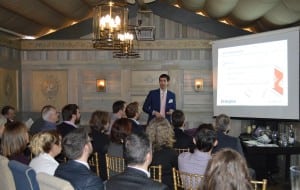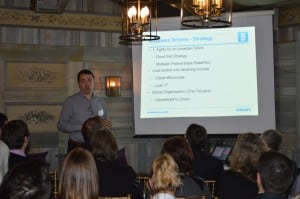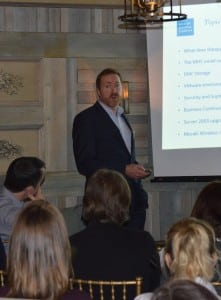Welcome to part two of our Windows End of Life (EOL) series. In this entry, we bring you up to date on the key points raised by our audience at a Datapac breakfast seminar held last week. So make yourself comfortable and in about five to seven minutes, depending on how fast you read, you’ll have more clarity on this critical subject.
On 5th March Datapac welcomed its customers to the elegant surrounds of Residence Members Club on St Stephen’s Green in Dublin. Attendees gathered for breakfast, and the stream of conversation was punctuated by clinking cups of coffee as the crowd had ample time to enjoy breakfast and chat before the presentation began.
David Kinsella, CTO, Datapac, kept the conversational vibe going as he kicked off the event asking the audience, what is your migration plan? David pointed out that, as of mid-March 2015, there’s only 125 days left until end of life for the operating system.
From July 14th, anyone using that OS will no longer receive security patches that help protect PCs from harmful viruses, spyware and other malicious software. Microsoft will no longer provide technical support and there will be no more software and content updates for Windows Server 2003.
The first customer speaker up was Michael Duggan, CIO, Trócaire, who presented around their journey to the cloud and choosing Office 365. As an NGO, Trócaire faces some extremely complex challenges in terms of security and connectivity. It carries out humanitarian and other programmes in challenging locations where connectivity is difficult such as sub-Saharan Africa.
Trócaire also faces strict regulations about data security and has very involved compliance procedures, just like a commercial business. Each one of its aid programmes last five years and it is required to hold data for seven years.
Michael explained that cloud solution works well for Trócaire as it is reliable, faces no connectivity barriers and ensures charity’s data is completely safe and complies to regulations. Michael also said the solution has released the three members of Trócaire’s IT team from the humdrum day-to-day side of technology, and enabled the team to contribute to the strategy of the organisation and bring it into the digital future.
Niall O’Dowd, IT Director, Mason Hayes & Curran, discussed the challenges of migration from Windows Server 2003 from the perspective of an established legal firm, with offices in Ireland, London and New York. Mason Hayes & Curran have approximately 370 staff and a large volume of emails passing through its servers each day.
Given the confidential nature of the industry, the company has a huge need for security to protect extremely sensitive legal information. Serving a global client base and in an always on environments such as this Mason Hayes & Curran needs reliable, 24/7 access to its IT systems.
Mason Hayes & Curran is currently carrying out its migration of these systems to 2003 and Datapac is ensuring that migration is seamless and smooth, maintains 24/7 uptime and meets demands of both users and clients.
The legal firm also looks after a number of very high profile technology clients and bandwidth is critical when it comes to in-house meetings with these clients. Niall told the audience how he entrusts that considerable responsibility to the team at Datapac.
The event was brought to a close with a Q&A, and there was great participation and interaction between the speakers and the audience.
David made an important point that no matter what way you migrate, it is absolutely critical to update your OS. Web facing servers will continue to be vulnerable to threats, which are unavoidable on the internet today. What is more, when it comes to anti-virus software, these won’t protect your data unless you update your OS. Furthermore, from a customer point of view, it doesn’t look good if your company is leaving sensitive information unprotected.
Another key point that resulted from the Q&A is that there is no one size fits all option when it comes to migrating from Windows Server 2003. Different solutions exist for organisations with different needs, such as Mason Hayes & Curran and Trócaire. Datapac is best-placed to assess a business, no matter what size, and recommend the best migration strategy, whether that is private cloud, public cloud, hybrid or application virtualisation.
For example, Trócaire chose the cloud option as it is easily scalable according to its needs, and easily accessed from anywhere, even the far flung remote territories they work from. Mason Hayes & Curran has its own different set of needs, including security demands, volumes of data, redundancy, back-up and disaster recovery. For all requirements, Datapac can provide expert advice, support and solutions.
How to choose the right migration plan from Windows Server 2003?
Whether you want to leverage the cloud, use a hybrid solution or virtualise, Datapac has the knowledge and experience to tell small, medium or large businesses which is the best for their needs. The team at Datapac is there to assess your needs and find the right answer for you to ensure a painless migration into the future. Speak to our team to make your life easier.
Register for upcoming events
-
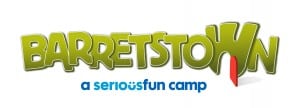 "At Barretstown, we rebuild the lives of children, and their families, affected by childhood cancer and other serious illnesses. We serve 5,000 campers a year and have 1200 volunteers each year. Communication is crucially important and Datapac has helped us to streamline, improve and ensure efficiency."
"At Barretstown, we rebuild the lives of children, and their families, affected by childhood cancer and other serious illnesses. We serve 5,000 campers a year and have 1200 volunteers each year. Communication is crucially important and Datapac has helped us to streamline, improve and ensure efficiency." -
 "Datapac has provided us with a fantastic product and world-class levels of service and support. Whenever people ask me about our experience with Datapac I’m always ready to sing their praises and I would happily recommend their services to any organisation."
"Datapac has provided us with a fantastic product and world-class levels of service and support. Whenever people ask me about our experience with Datapac I’m always ready to sing their praises and I would happily recommend their services to any organisation." -
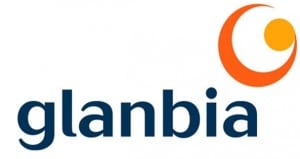 "For many years Datapac has been our sole supplier for the maintenance of Personal Computers and Peripherals in Ireland. Through their Service Centres in Wexford and Dublin, Datapac provides excellent support to our businesses throughout the country and consistently meets the SLA targets which we have set. The skill, expertise and experience of their engineers and other technical support personnel are of the highest standard."
"For many years Datapac has been our sole supplier for the maintenance of Personal Computers and Peripherals in Ireland. Through their Service Centres in Wexford and Dublin, Datapac provides excellent support to our businesses throughout the country and consistently meets the SLA targets which we have set. The skill, expertise and experience of their engineers and other technical support personnel are of the highest standard." -
 “The value of dealing with an HP Gold partner in this process can’t be underestimated. Datapac provide us with a local touch and can cover the full range of our IT requirements, but when there is a specific technical requirement like this, they can bring the specialist technical resources of HP to the table. HP and Datapac had a thorough discussion with us around our requirement - and had really done their homework - and then were able to provide us with a very highly specified test platform for us to prove the application on before we committed to purchase.”
“The value of dealing with an HP Gold partner in this process can’t be underestimated. Datapac provide us with a local touch and can cover the full range of our IT requirements, but when there is a specific technical requirement like this, they can bring the specialist technical resources of HP to the table. HP and Datapac had a thorough discussion with us around our requirement - and had really done their homework - and then were able to provide us with a very highly specified test platform for us to prove the application on before we committed to purchase.” -
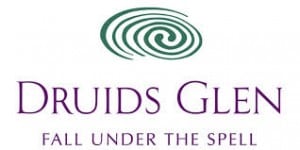 Datapac understands our needs and requirements and has the expertise and experience to follow through on all our requests. Our constant need to reduce costs has been assisted by Datapac's ability to suggest alternative solutions and methods whilst improving both efficiency and productivity. Our partnership with Datapac is akin to having an IT department on site that we simply could not provide ourselves.
Datapac understands our needs and requirements and has the expertise and experience to follow through on all our requests. Our constant need to reduce costs has been assisted by Datapac's ability to suggest alternative solutions and methods whilst improving both efficiency and productivity. Our partnership with Datapac is akin to having an IT department on site that we simply could not provide ourselves.

